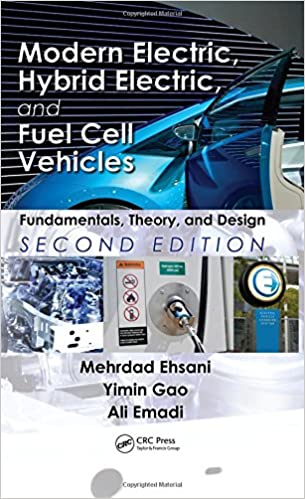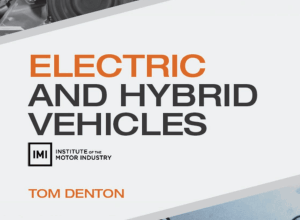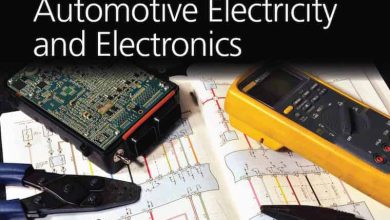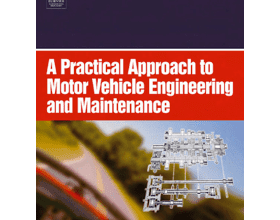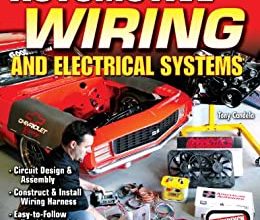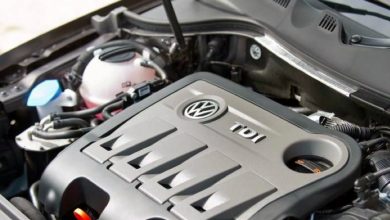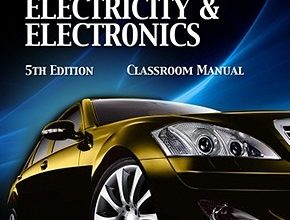Free eBook: Modern Electric Hybrid Electric and Fuel-Cell Vehicles
By Mehrdad Ehsani, Yimin Gao, Ali Emadi, Second Edition
| Book Format | |
| Book Language | English |
| Book Size | 20 MB |
| Page Count | 557 |
| Print ISBN | 978-1-4200-5398-2 |
| Publisher | December 21st, 2017 by CRC Press |
| Author | Mehrdad Ehsani, Yimin Gao, Ali Emadi |
ABOUT THIS BOOK
Air pollution, global warming, and the steady decrease in petroleum resources continue to stimulate interest in the development of safe, clean, and highly efficient transportation. Building on the foundation of the bestselling first edition, Modern Electric, Hybrid Electric, and Fuel Cell Vehicles: Fundamentals, Theory, and Design, the Second Edition updates and expands its detailed coverage of the vehicle technologies that offer the most promising solutions to these issues affecting the automotive industry.
.... View More
Proven as a useful in-depth resource and comprehensive reference for modern automotive systems engineers, students, and researchers, this book speaks from the perspective of the overall drive train system and not just its individual components.
New to the second edition:
-
- A case study appendix that breaks down the Toyota Prius hybrid system
- Corrections and updates of the material in the first edition
- Three new chapters on drive train design methodology and control principles
- A completely rewritten chapter on Fundamentals of Regenerative Braking
Employing sufficient mathematical rigour, the authors comprehensively cover vehicle performance characteristics, EV and HEV configurations, control strategies, modelling, and simulations for modern vehicles.
They also cover topics including:
- Drive train architecture analysis and design methodologies
- Internal Combustion Engine (ICE)-based drive trains
- Electric propulsion systems
- Energy storage systems
- Regenerative braking
- Fuel cell applications in vehicles
- Hybrid-electric drive train design
The first edition of this book gave practicing engineers and students a systematic reference to fully understand the essentials of this new technology. This edition introduces newer topics and offers deeper treatments than those included in the first. Revised many times over many years, it will greatly aid engineers, students, researchers, and other professionals who are working in automotive-related industries, as well as those in government and academia.
DOWNLOAD: Modern Electric, Hybrid Electric, and Fuel Cell Vehicles
Download for free or kindly support the author by purchasing the book from the publisher’s website.
TABLE OF CONTENTS
- Environmental Impact and History of Modern Transportation.
- Fundamentals of Vehicle Propulsion and Braking.
- Internal Combustion Engines.
- Vehicle Transmission.
- Electric Vehicles.
- Hybrid Electric Vehicles.
- Electric Propulsion Systems.
- Design Principle of Series (Electrical Coupling) Hybrid Electric Drivetrain.
- Parallel (Mechanically Coupled) Hybrid Electric Drivetrain Design.
- Design and Control Methodology of Series–Parallel (Torque and Speed Coupling) Hybrid Drivetrain.
- Design and Control Principles of Plug-In Hybrid Electric Vehicles.
- Mild Hybrid Electric Drivetrain Design. Peaking Power Sources and Energy Storage.
- Fundamentals of Regenerative Braking. Fuel Cells.
- Fuel Cell Hybrid Electric Drivetrain Design.
- Design of Series Hybrid Drivetrain for Off-Road Vehicles.
- Design of Full-Size-Engine HEV with Optimal Hybridization Ratio.
- Powertrain Optimization.
- User Guide for Multiobjective Optimization Toolbox.
ABOUT THE AUTHORS
M. Ehsani is the Robert M. Kennedy Professor or Electrical engineering at Texas A&M University. From 1974 to 1981, he was a research engineer at the Fusion Research Center, University of Texas and with Argonne National Laboratory, Argonne, Illinois, as a Resident Research Associate. Since 1981, he has been at Texas A&M University, College Station, Texas where he is now an endowed professor of electrical engineering and Director of the Advanced Vehicle Systems Research Program and the Power Electronics and Motor Drives Laboratory. He is the author of over 400 publications in pulsed-power supplies, high-voltage engineering, power electronics, motor drives, advanced vehicle systems, and sustainable energy engineering. He is the recipient of several Prize Paper Awards from the IEEE-Industry Applications Society, as well as over 100 other international honors and recognitions, including the IEEE Vehicular Society 2001 Avant Garde Award for “Contributions to the theory and design of hybrid electric vehicles.” In 2003, he was selected for the IEEE Undergraduate Teaching Award “For outstanding contributions to advanced curriculum development and teaching of power electronics and drives.” In 2005, he was elected as the Fellow of Society of Automotive Engineers (SAE). He is the co-author of 17 books on power electronics, motor drives and advanced vehicle systems. He has over 30 granted or pending US and EU patents. His current research work is in power electronics, motor drives, hybrid vehicles and their control systems, and sustainable energy engineering. Dr. Ehsani has been a member of IEEE Power Electronics Society (PELS) AdCom, past Chairman of PELS Educational Affairs Committee, past Chairman of IEEE-IAS Industrial Power Converter Committee and past chairman of the IEEE Myron Zucker Student-Faculty Grant program. He was the General Chair of the IEEE Power Electronics Specialist Conference for 1990. He is the founder of IEEE Power and Propulsion Conference, the founding chairman of the IEEE VTS Vehicle Power and Propulsion and chairman of Convergence Fellowship Committees. In 2002 he was elected to the Board of Governors of VTS. He has also served on the editorial board of several technical journals and was the associate editor of IEEE Transactions on Industrial Electronics and IEEE Transactions on Vehicular Technology. He is a Life Fellow of IEEE, a past IEEE Industrial Electronics Society and Vehicular Technology Society Distinguished Speaker, IEEE Industry Applications Society and Power Engineering Society Distinguished Lecturer. He is also a registered professional engineer in the State of Texas.
Yimin Gao received his B.S., M.S., and Ph.D. degrees in mechanical engineering (major in development, design, and manufacturing of automotive systems) in 1982, 1986, and 1991, respectively, all from Jilin University of Technology, Changchun, Jilin, China. From 1982 to 1983, he worked as a vehicle design engineer in DongFeng Motor Company, Shiyan, Hubei, China. He finished a layout design of a 5-ton truck (EQ144) and participated in prototyping and testing. From 1983 to 1986, he was a graduate student in Automotive Engineering College of Jilin University of Technology, Changchun, Jilin, China. His working field was improvement of vehicle fuel economy by optimal matching of engine and transmission. From 1987 to 1992, he was a Ph.D. student in the Automotive Engineering College of Jilin University of Technology, Changchun, Jilin, China. During this period, he worked on research and development of legged vehicles, which can potentially operate in harsh environments where mobility is difficult for wheeled vehicles. From 1991 to 1995, he was an associate professor and automotive design engineer in the Automotive Engineering College of Jilin University of Technology. In this period, he taught undergraduate students the course of Automotive Theory and Design several rounds and graduate students the course of Automotive Experiment Technique two rounds. Meanwhile, he also conducted vehicle performance, chassis, and components analysis, and conducted automotive design including chassis design, power train design, suspension design, steering system design, and brake design. He jointed the Advanced Vehicle Systems Research Program at Texas A&M University in 1995 as a research associate. Since then, he has been working in this program on research and development of electric and hybrid electric vehicles. His research areas are mainly on the fundamentals, architecture, control, modeling, design of electric and hybrid electric drive trains and major components. He is a member of SAE.


